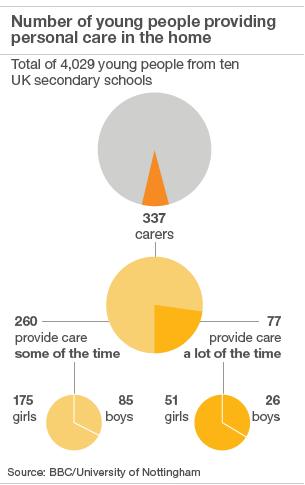Number of child carers 'four times previous estimate'
- Published
Leigh, aged eight, cares for her mother, Kirsty, who suffers from bipolar disorder
There are four times more young carers in the UK than are officially recognised, figures published by the BBC suggest.
One in 12 of the 4,029 schoolchildren asked by the BBC said they had caring responsibilities - such as dressing, washing or bathing family members.
If the survey reflects the UK as a whole, it would mean there are about 700,000 young carers in the UK.
The 2001 census, though, identified only 175,000 young carers.
Responding to the survey, Care Services Minister Paul Burstow said the research "rightly highlights the numbers of hidden young carers", some of whom were "shouldering intolerable burdens".
He said the government would make £400m available for carers' breaks over the next four years.
Earlier, the Children's Minister for England, Sarah Teather, said it was "shocking" that child carers did not get the support they needed or the recognition they deserved.
A total of 4,029 pupils from 10 UK secondary schools responded to a questionnaire designed by academics at the University of Nottingham.
The questions asked about both the levels of responsibility young people had in the home, and the types of caring activity they undertook.
Of those who responded, 337 (8%) said they had carried out "personal care" of someone in their home either "a lot of the time" or "some of the time" over the previous month.
This includes activities such as helping the person they care for to dress, wash, bathe or shower.
'Wake-up call'
Professor Saul Becker, head of the school of sociology and social policy at the University of Nottingham, said the survey pointed to a "hidden army" of UK young carers.
The figures were a "wake-up call" to governments and carers' organisations, he said.
Prof Becker said the figures showed "the real underbelly, if you like, of what young carers in the UK are having to do - very difficult, very personal, very intimate, very draining care -giving tasks and responsibilities which, in many circumstances, deprives them of their childhood".

Separately, 29% of the school pupils who took part in the survey said they had carried out "emotional care" of someone in their home either "a lot of the time" or "some of the time" over the preceding month.
This could include sitting with the person they care for, reading to them, or taking them out for a walk.
While these would not all necessarily be considered young carers, it is likely that many of them are providing support for family members with mental illnesses or addictions to drugs or alcohol.
'No surprise'
Sonia Flint, from Derbyshire and Derby City Young Carers Action for Children, said there was a "hidden group" of young carers in the latter group whose situation had a big impact on their lives.
"They may worry that dad might hurt himself again or worry mum might fall over, and it's a kind of a constant worry throughout the day," she said.
Campaigners and charity groups have been arguing for years that the official 175,000 figure is a vast underestimate.
The National Young Carers Coalition, a group of charities including the Princess Royal Trust for Carers, Barnardo's and the Children's Society, said the figures came as "no surprise".
Care Services Minister Paul Burstow said young carers ''deserved a life''
The organisation points out that the census figures asked parents, rather than children, to complete questionnaires and made no mention of more stigmatised conditions, such as mental health, substance misuse or HIV/Aids.
"Whilst the new figures from the BBC give us a more realistic picture of the scale of the problem, we still believe that there are many more than 700,000 children and young people providing care to parents or family members, who are unrecognised and without support across the UK," the group said.
The four UK Children's Commissioners (one each for England, Wales, Scotland and Northern Ireland) said in a joint statement that young carers were "often caught in the middle of a well-meaning muddle".
It said they could miss out on vital support and called on governments at Westminster and in the nations to "properly identify and meet the needs of young carers, so that this largely invisible and often vulnerable group can get the support they need".
Maggie Atkinson, the Children's Commissioner for England, told the BBC child carers "save the state millions" and many of them "lose their childhoods".
She said child carers who were having difficulty getting help should try to raise problems with their GPs or school staff.
Mr Burstow said schools and GPs should help to identify young carers who required more support.
Shadow education secretary Andy Burnham said it was "absolutely crucial" that young carers were identified and supported.
He warned that "ill-thought-through reforms" in health and education could result in "disjointed and fragmented local services".
Other campaigners are worried young carers' services are being cut by councils and other bodies trying to rein in the country's debt after the recession.
The National Young Carers Coalition says there should be no cuts for services that support young carers, "so that they are not forced into caring roles that are inappropriate and damaging to their health and wellbeing".